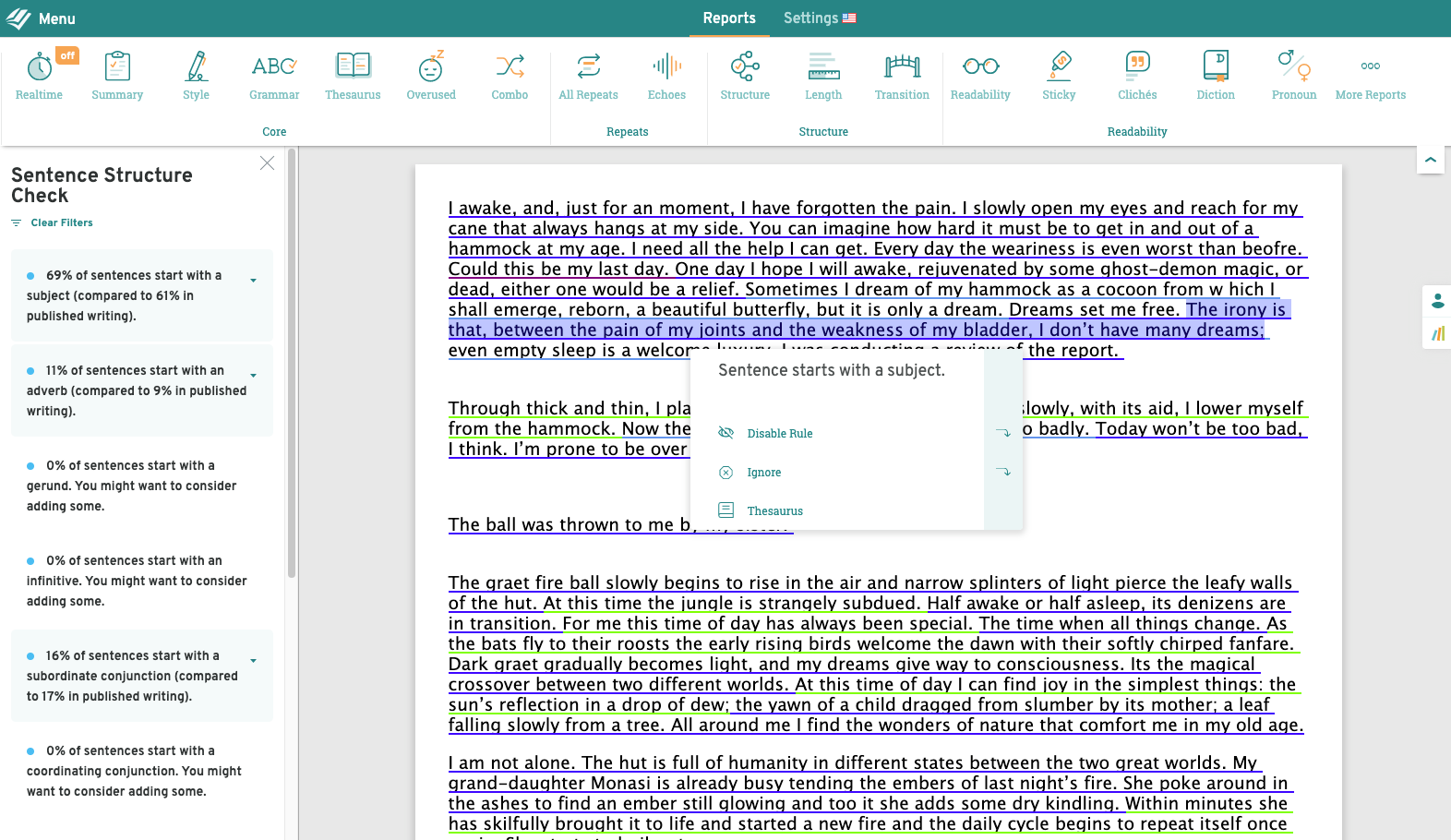
Variety, as we all know, is the spice of life. It’s also the spice of good writing.
There’s an easy way to find out if your sentences have variety. Take a paragraph you’ve written—one of eight or so sentences. Then, write down the first word in each sentence. Next, identify the part of speech for each word. If most of your sentences begin with the same part of speech, you don’t have variety.
It’s as simple as that.
Is a lack of variety harming your advancement?
It’s been said that “whenever you put words on paper or on a computer screen, you are letting others see into your brain.” What do others see when they read what you’ve written? Do they pick up a lack of originality? A lack of verbal flexibility? A lack of passion for the written word?
Do they mock the simplicity of an utterance such as, “This is an island, surrounded by water. Big water. Ocean water”? Or, do they admire the inspiration found in an utterance like this from Ronald Reagan: “No government ever voluntarily reduces itself in size. Government programs, once launched, never disappear. Actually, a government bureau is the nearest thing to eternal life we’ll ever see on this earth!” (Note that Reagan’s sentences begin with an adjective, a noun used as an adjective, and an adverb. See what I mean about variety?)
When I taught business writing to Department of Defense employees, they would often ask me to look over their SF171s—the form needed to apply for a new job or a promotion. Far too often, the verbiage looked like this: "I have worked for the Department of Defense for 12 years. I have demonstrated competence with emerging technology. I have met every assignment given me on time. I have made significant contribution to whatever team I was part of. I have enjoyed the challenges given me.”
“I, I, I, I, I.” Is there anything wrong with starting every sentence with a pronoun? Technically, no. Is there anything compelling about reading every sentence that starts the same way? Not really.
Syntactical Sameness
We tend to speak in a simple subject-verb-direct object fashion—“I ate a pizza,” for example. And when it comes to writing, we tend to record our thoughts using the same syntax. If you believe that variety is the spice of life, you will understand how variety can breathe life into your prose.
If you’re interested in improving your writing style, here are alternatives to the basic noun-verb-noun format. Let’s take the famous saying, "Don't cross your bridges until you come to them" as our exemplar. (This sentence begins with a verb, by the way, so we already have our first alternative to the noun-verb-noun structure: starting the sentence with a verb.)
Start with an Expletive
No, we don’t mean the four-letter words that got Richard Nixon into so much trouble on tape. Instead, we are referring to the linguistic sentence-opener that uses phrases such as "It is" or "There are." Periodically, use this kind of expletive to begin your thoughts. Our aphorism would become: "It is critical that we not cross bridges until we come to them."
Start with a Gerund
Simply for the sake of variety, we can begin our sentences with this verb form that usually ends in "-ing." The original saying with a gerund might run: "Crossing your bridges before you come to them can mean wasted time and energy."
Start with an Adverb
The effective writer has numerous tools at his or her fingertips—tools for bringing a fresh slant to the points being made. One such syntactical tool is the adverb, which tells us when, where, how, or to what extent. To pique a reader’s interest, your original sentence could be re-written this way: "When you get to the bridge, then you can cross it."
Start with a Preposition
These short words introduce a group of words. The whole group, known as the prepositional phrase, provides more information about the basic noun or verb. Our saying could be reworked to: "In the interest of time, avoid crossing bridges until you come to them."
Start with an Infinitive Phrase
One of the world’s most frequently quoted lines begins with an infinitive phrase: "To be or not to be." Applied to our saying, the revision might read: "To prepare to cross a bridge before you come to it is usually a waste of time."
Start with a Dependent Clause
Grammar-meisters know such clauses begin with subordinating conjunctions—words such as when, if, while, although. The new saying, starting with a dependent clause, could be: "If you cross your bridges before you come to them, you will be sorry."
Coco’s comment
Coco Chanel, born in 1883, was known for more than her fashion style. She is also remembered for providing quote-lovers with a number of insights that have inspired people all over the world for more than a century. It was she who observed, “There is no time for cut-and-dried monotony. There is time for work. And time for love. That leaves no other time.”
If words are the work you love, you will seek to avoid monotony. Having variety in your sentence structure will make that search ever more interesting.
The Sentence Structure Report
Dr Caroselli pitched us this post in 2018 and, coincidentally, the team at ProWritingAid had just begun working on a new Sentence Structure Variety Report. That report is now a fully-fledged part of the editor! The Structure Report analyzes the percentage of your sentences that begin with a subject, adverb, infinitive phrase, subordinate conjunction, coordinating conjunction, transitional phrase or where you have inverted your subject and verb.

When you vary your sentence structures, readers will be more engaged.
Beyond mixing up your sentence lengths, start your sentences differently. Begin some with gerunds or a subordinate conjunction. Be brave and start sentences with a past participle or an adverb.
Find out more about the sentence structure report here.

